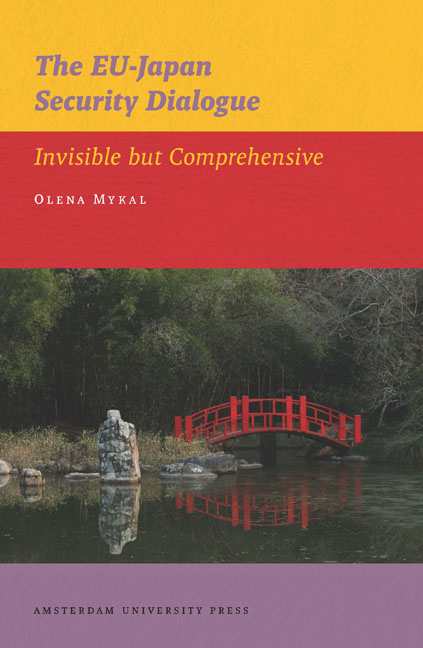Book contents
- Frontmatter
- Dedication
- Contents
- Abbreviations
- Acknowledgements
- Preface
- Introduction
- PART ONE DEVELOPING CONCEPTIONS OF SECURITY AND JOINT AGENDA OF THE EU-JAPAN SECURITY DIALOGUE
- PART TWO COMMON INTERESTS IN THE EU-JAPAN SECURITY DIALOGUE: ANALYSIS OF JOINT ACTIVITIES
- Conclusion
- About the Author
- Notes
- Bibliography
- Index
- Publications Series
3 - A Time of Turmoil: EU-Japan Security Dialogue in 2001-2006
Published online by Cambridge University Press: 22 January 2021
- Frontmatter
- Dedication
- Contents
- Abbreviations
- Acknowledgements
- Preface
- Introduction
- PART ONE DEVELOPING CONCEPTIONS OF SECURITY AND JOINT AGENDA OF THE EU-JAPAN SECURITY DIALOGUE
- PART TWO COMMON INTERESTS IN THE EU-JAPAN SECURITY DIALOGUE: ANALYSIS OF JOINT ACTIVITIES
- Conclusion
- About the Author
- Notes
- Bibliography
- Index
- Publications Series
Summary
The previous chapter examined the development of the security dialogue between the European Union and Japan in the 1990s after the end of the Cold War. We learned that Japanese and European leaders agreed to enter a new stage of cooperation and declared the next ten years to be the ‘Decade of Japan-Europe Co-operation’ at the EU-Japan Summit of 19 July 2000 (9th EU-Japan Summit 2000a).
This chapter examines the discourse analysis of the development of the security dialogue between the EU and Japan during the period 2001 to 2006. Its main argument is that the EU-Japan security dialogue was undergoing a process of strengthening and deepening in the early years of the 21st century as a result of international developments and modifications in the European and Japanese security conceptualisations. To demonstrate this hypothesis, this chapter is organised in three distinctive parts: the first examines the security conceptualisation into Japan in the period 2001-2006; the second focuses on security conceptualisation in Europe during the same period; the third analyses the EU and Japan's security dialogue, utilising their security conceptualisations and taking into account various changes in the world.
This third and core part of the chapter is divided into four sections. The first section examines the EU-Japan Cooperation Action Plan of 2001, its implications and significance for the development of the EUJapan security dialogue; the second analyses the influence of the events of 9/11 on the security dialogue and describes disarmament and nonproliferation issues in the security dialogue; the third describes and analyses the China embargo issue and assesses what the implications may be for the EU-Japan security dialogue; the final section discusses the state of the dialogue in the mid-2000s, its problems and prospects, and also offers predictions and prescriptions for its improvement.
Conceptualisation of Security in Japan in 2001-2006
In December 1998 Prime Minister Keizo Obuchi (1998b) emphasised the importance of ‘human security’ in making the 21st century a ‘human- centred century’ at the conference ‘An Intellectual Dialogue on Building Asia's Tomorrow’ as a follow-up to his speech in Singapore on 4 May 1998 (Obuchi 1998a). He made it quite clear that Japan had incorporated the human security concept into its foreign policy.
- Type
- Chapter
- Information
- The EU-Japan Security DialogueInvisible but Comprehensive, pp. 95 - 128Publisher: Amsterdam University PressPrint publication year: 2012



